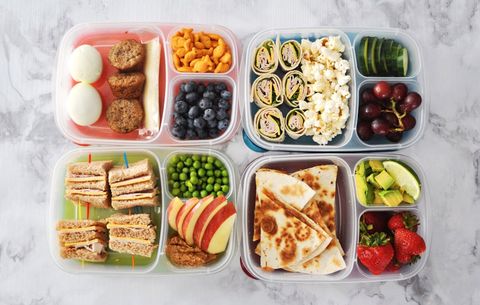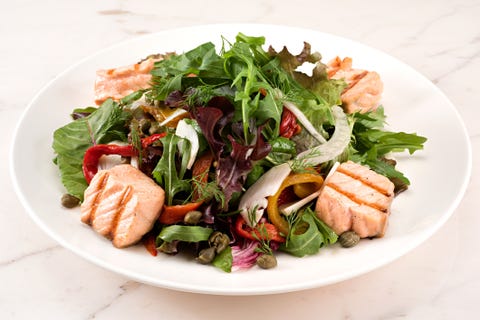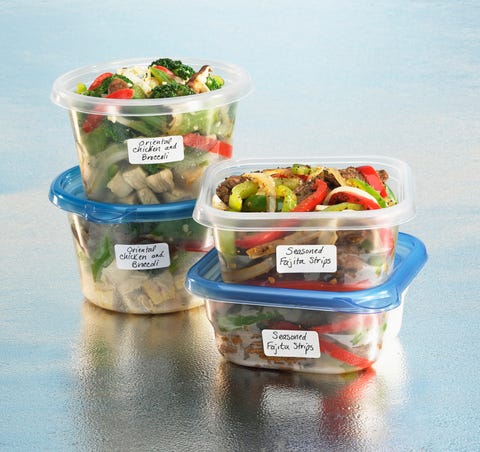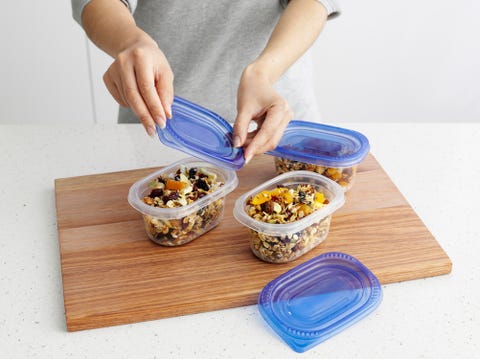

Guys, there’s a secret to eating healthy, home-cooked meals that won’t waste hours after work — and no, it’s not investing in a personal chef. It’s meal prepping, or creating a few meals or dishes and portioning them out throughout the week. This can be as easy as stocking up on cottage cheese for breakfast, or as complicated as making a bunch of meals on Sunday and saving them for the rest of the week. Either way, it will save you time and money — and it’ll ensure that you stick to a healthy diet.
“One of the biggest downfalls I see with clients regarding their compliance to their nutrition program is making poor nutrition decisions in the moment,” says Men’s Health nutrition advisor Mike Roussell, Ph.D. “When you prep meals ahead of time, you don’t need to make any decisions at meal time. All the work has already been done. You just need to eat.”
Need help getting started? We’ve outlined the basics and provided some tips to make it a bit less overwhelming.
1) Calculate how many meals you need.
Think about how many breakfasts, lunches, snacks and dinners you’ll need throughout the week. Technically, if you want enough breakfast, lunches and dinners for the workweek, you would need 15 meals, but you don’t have to cook 15 separate dishes. Instead, prepare a few large batches of meat and vegetables that can be used in various ways throughout the week.
Check out this downloadable template from The Kitchn to plan for the week. Or try one of our easy protein-packed recipes. And one additional tip: ve sure to factor in things like dates and meals with clients. That way, you can plan more efficiently and avoid wasting food.

Burcu Atalay Tankut
2) Keep it simple.
If you’re new to cooking, Registered Dietitian and health coach at StrongerU, Jessica Bachman, PhD, MS-MPH, recommends staying away from recipes that require too many ingredients. Instead, “think of a meal as a veggie, a protein and a starch,” she says. So for instance, a quick dinner could be roasted pork loin, broccoli, and sweet potato.
3) Utilize leftovers.
Bachman’s clients often struggle with planning both lunch and dinner. “Just choose one meal to start with. Then once you get a handle on that, start adding in more,” she says. Plus, you can make extra for dinner and eat the leftovers for lunch. “That’s so much easier than trying to take a different meal for lunch every day,” she explains.

Image Studios
4) Opt for easy cooking methods.
Sure, you may love the grill marks on that chicken, but cooking on the grill or stove requires more attention. Bachman recommends using an oven or slow cooker, since you can throw food in for a designated amount of time and simply monitor its progress. Plus, it’s easier to cook large batches of food with both of these methods.
5) Rely on frozen foods.
There’s no need to prepare every single item on your plate. Instead of washing, cutting and steaming that side of broccoli, buy frozen vegetables instead. Additionally, many frozen fruits and vegetables, like broccoli, have just as many vitamins and minerals as their fresh counterparts.
6) Keep breakfast simple.
Mornings can be hectic, which is why Bachman recommends having the same breakfast every day. Just chop up some fruit so it can be thrown in the blender for smoothies, or pair it with Greek yogurt for a change of pace.

istetiana
7) Have a go-to snack.
Similarly, Bachman advises choosing one snack, like pre-portioned nuts or a batch of hard-boiled eggs, that you can eat every day. That way, you won’t have to hit up the vending machine when you’re hit with the munchies.
8) Get creative.
Eating chicken every night doesn’t have to be boring. Bachman says she makes a big batch of shredded chicken every week and uses it for a variety of dishes, like salads or fajitas. She recommends having a variety of sauces and seasonings on-hand, such as barbeque, buffalo, etc., to make each meal feel unique.
9) Write out your list and go shopping.
With your meals lined up, it’s time to make a grocery list and head to the store. Try to do your big weekly shop on Saturday or early Sunday, so you have time to prep your ingredients before the work week begins. To get in and out as fast as possible, organize your grocery list by section (produce, meat, dairy, etc.).

BRETT STEVENS
10) Keep track of how long your items are in the fridge.
Cooked meat can safely be stored for three to four days in your fridge. After that, it’s time to freeze.
11) Choose the best products to prep and pack your food.
It’s worth blocking out time on the weekend to get your ingredients ready for weekday meal assembly. “Once the week starts, there’s a greater chance that the prep just won’t happen,” Roussell says. Invest in a good set of clear glass or plastic containers so you know exactly how much you have. Here are some of the products we love:
Source: Read Full Article